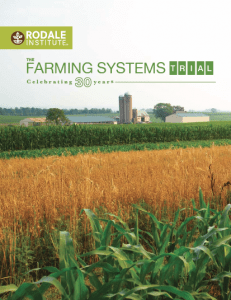 Is organic farming more resilient, higher yielding, more energy efficient and more profitable? The Rodale Institute’s latest report of a 30 year trial says it is. Read the full report free here.
Is organic farming more resilient, higher yielding, more energy efficient and more profitable? The Rodale Institute’s latest report of a 30 year trial says it is. Read the full report free here.
The Farming Systems Trial (FST)® at Rodale Institute is America’s longest running, side-by-side comparison of organic and chemical agriculture. Started in 1981 to study what happens during the transition from chemical to organic agriculture, the FST surprised a food community that still scoffed at organic practices. After an initial decline in yields during the first few years of transition, the organic system soon rebounded to match or surpass the conventional system. Over time, FST became a comparison between the long term potential of the two systems.
After a 30 year side-by-side trial, the Rodale report shows:
Organic yields match conventional yields.
Organic outperforms conventional in years of drought.
Organic farming systems build rather than deplete soil organic matter, making it a more sustainable system.
Organic farming uses 45% less energy and is more efficient.
Conventional systems produce 40% more greenhouse gases.
Organic farming systems are more profitable than conventional.
Although the Rodale Institute Farming Systems Trial is America’s longest-running side-by-side comparison of organic versus conventional farming, a number of universities have established long-term trials over the years. Between them all, they know that organic agriculture is more profitable, builds more soil fertility over time, and can yield just as much as conventional systems.
“As we face uncertain and extreme weather patterns, growing scarcity and expense of oil, lack of water, and a growing population, we will require farming systems that can adapt, withstand or even mitigate these problems while producing healthy, nourishing food. After more than 30 years of side-by-side research in our Farming Systems Trial (FST), Rodale Institute has demonstrated that organic farming is better equipped to feed us now and well into the ever changing future.”
You can read the full Farming Systems Trial Report free HERE.

